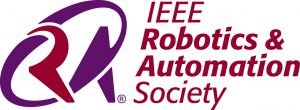Date: Tuesday 22 May 2018
Duration: 10:00am – 1:00pm
Room: P7
Organisers: Raja Chatila & Raj Madhavan
Robotics and Artificial Intelligence have reached an unprecedented widespread dissemination in many industry and service sectors. AI software and systems, interactive devices and physical robots are now present in daily human activities. The impact on human societies is however not always perceived as beneficial and this has triggered off multiple reflections and discussions about their economical, social, philosophical and ethical consequences. Several countries and international organizations consider the issues at stake of enough importance to organize debates to assess their transformative effect on both individuals and societies, and to develop specific policies to address them.
However, academics, researchers, and engineers who are behind the development of these technologies are too often absent from this debate, or even unaware about their responsibility.
The ICRA 2018 Ethics Forum, co-organised with the IEEE RAS “Robotics and Automation Research and Practice Ethics Committee” (RARPEC) provides a venue for engaging reflections and discussions on these issues, informed by presentations by distinguished speakers.
Program
10:00 Introduction – Raja Chatila & Raj Madhavan
10:10 Jobs and technology, how AI changes the rules – Greg Adamson
10:35 Trust and Bias – Why should roboticists care? – Ayanna Howard
11:00 The ethics of technology and the technology of ethics – Robert Williamson
11:25 What robots represent…. and why it matters? – Robert Sparrow
11:50 Ethical Considerations on Robot Personhood – Raja Chatila
12:15 Panel discussion
Greg Adamson
Associate Professor at the University of Melbourne, Past-President of the IEEE Social Implications of Technology, and IEEE Ethics Champion for 2018.
Title: Jobs and technology, how AI changes the rules
Abstract: Concerns about jobs and automation commonly evoke the inductive response, ‘technology replaces jobs, and it creates new jobs’. But what will happen if the ‘new jobs’ are done by robots from day 1?
Ayanna Howard
Chair, School of Interactive Computing (IC), Linda J. and Mark C. Smith Chair Professor, Georgia Institute of Technology
Title: Trust and Bias – Why should roboticists care?
Abstract: As robots become more fully interactive with humans during the performance of our day-to-day activities, the role of trust and human bias integrated into our systems must be more carefully investigated. Trust conveys the concept that when interacting with robots, humans tend to exhibit similar behaviors as when interacting with other humans, and thus may misunderstand the risk associated with deferring their decisions to a robot. Given the breadth of effects that robots are expected to have on human life, when this aspect of trust is intertwined with our own algorithmic bias, we must be deliberative about the methods we deploy in order to mitigate the potential detrimental effects robots may have on our society. This talk discusses research that identifies these phenomena of trust and bias and suggests methods that might help to mitigate their effect.
Bob Williamson
Research School of Computer Science, Australian National University, Canberra, Australia
Distinguished Researcher, DATA61 | CSIRO
Title: The ethics of technology and the technology of ethics
Abstract: I will situate the question of the ethics of robots within the larger frame of the ethics of technology and explore what (if anything) is fundamentally different between robotics and technology in general. Then I will invert the question, and consider the technology of ethics, arguing that rather than being only a source of ethical problems, technology in general, and AI technologies in particular can contribute to the solution of ethical problems.
Robert Sparrow
Philosophy Program, Monash University, Adjunct Professor, Monash Bioethics Centre, Monash University.
ARC Centre of Excellence for Electromaterials Science.
Title: What robots represent…. and why it matters?
Abstract: One thing that distinguishes robots from other machines is the extent to which they operate at the level of meaning and not just mechanism. Indeed, the public’s enthusiasm for robots is as much a function of what robots represent — an opportunity to tell stories about what it means to be human — as of their purported utility. In this presentation, which draws upon my recent work on sex robots and on robots and race, I will suggest that the representational content of social robots implicates their designers in difficult ethical dilemmas. In order to try to address these, engineers need to think more consciously about the politics of the meanings their robots rely on and convey. If they don’t, robots risk re-inscribing the bigotries of today in the social relations of the future.
Raja Chatila
Institute of Intelligent Systems and Robotics, Sorbonne University – Paris, Past President IEEE Robotics and Automation Society (2014-2015), Chair, The IEEE Global Initiative on Ethics of Autonomous and Intelligent and Systems
Title: Ethical Considerations on Robot Personhood
Abstract: The debate about robot personhood and robot rights is ongoing in different circles involving AI and robotics researchers, lawyers, parliament members, policy makers, ethicists and philosophers, and are reflected in the media. On what grounds would personhood be granted to robots? Would this solve complex liability and accountability issues? What consequences would this quality have on their place in the human society? What is the relation to robot rights? What is the impact of building anthropomorphic robots and of emotion expression on this issue?


